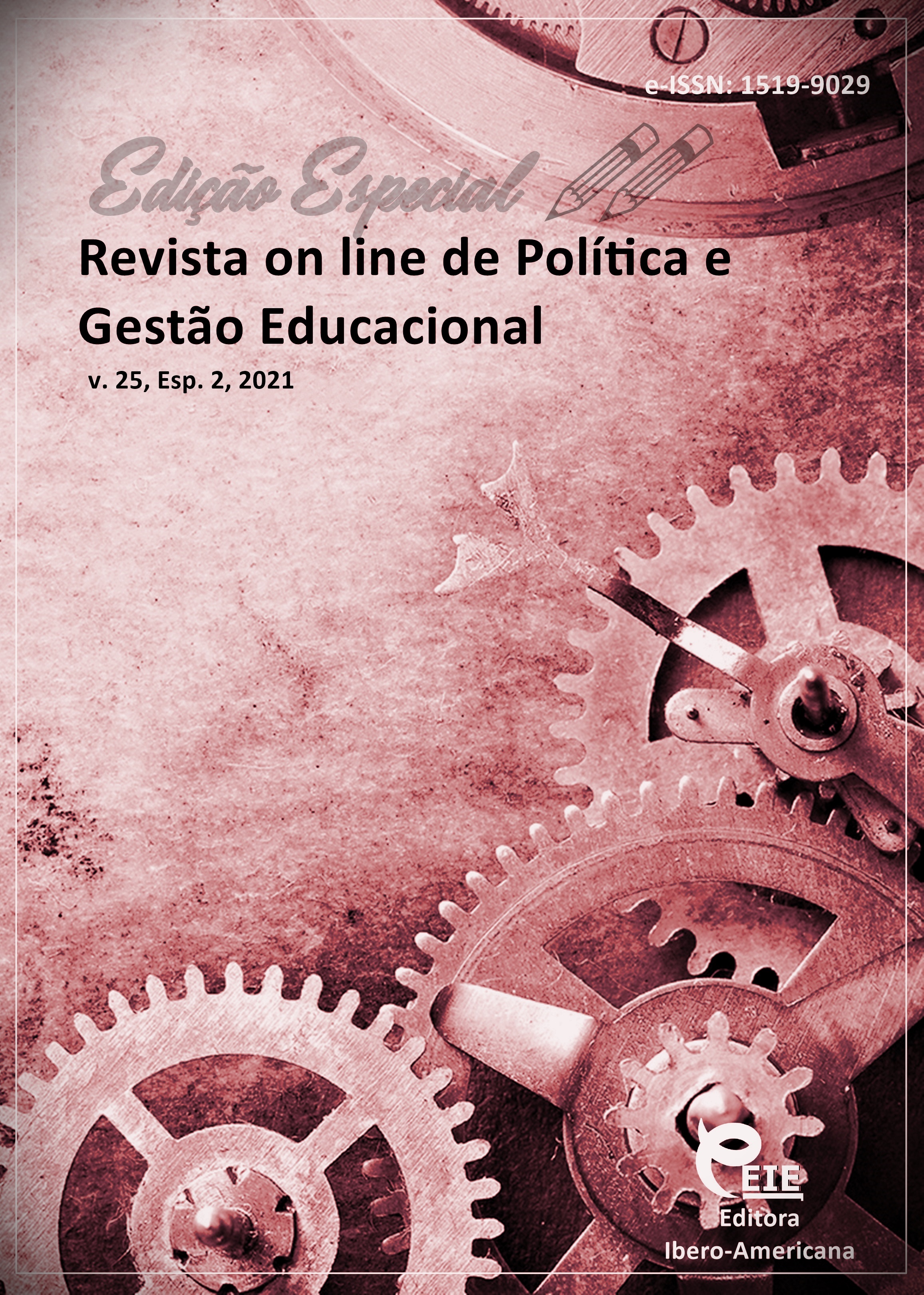International students in Russian universities: mass media role in attitude peculiarities formation to them and problems of adaptation
DOI:
https://doi.org/10.22633/rpge.v25iesp.2.15282Keywords:
Student youth, Migrant students, Education, Migration processesAbstract
Nowadays, one of the educational strategies is to strengthen international cooperation and attract international students to study in Russian universities. Migration issues currently remain relevant, and of a sensitive debatable nature, and for newsmakers, they are attractive. The study aims to investigate and analyze the presence of a stereotypical image of a migrant student, its content, nature, and orientation in the mass media. As a research method, a questionnaire survey was used to effectively investigate an international student's image studying at a Russian university with residents created by the mass media. The article examines the prevalence and features of stereotypes’ transmission about migrant students, the features of the formation of a migrant’s image in the media, identify the main problems of adaptation, difficulties faced by migrant students. The study's novelty and originality lie in the fact that the importance of the media environment for the management of international students' migration processes is determined for the first time. It is revealed that the most challenging issues for migrant students are: issues related to everyday life, employment, language acquisition, cultural customs, and unusual climatic conditions for them. It is revealed that information about migrant students in the media is not so standard. It is shown that there is more damaging information about migrants on the central channels than on the regional channels. The data obtained in this work can be used in ethnic psychology, social psychology, pedagogy, and age psychology.
Downloads
References
ANISIMOV, S. F. Spiritual values: production and consumption. Moscow: Mysl, 1988.
BARANOV, V. V. et al. Attitude to ethical consumption as new ecological practice. Humanities and Social Sciences Reviews, v. 7, n. 4, p. 1173-1179, 2019.
BAYANOVA, A. R. et al. A philosophical view of organizational culture policy in contemporary universities. European Journal of Science and Theology, v. 15, n. 3, p. 121-131, 2019.
BEREZKINA, O. P. Socio-psychological influences of mass media. Moscow: Akademiya, 2009.
BOGOMOLOVA, H. H. Social psychology of press, radio and television. Moscow: Moscow University Press, 1991.
BORONOYEV, A. O. Perestroika of social relations and personality. Leningrad: Chelovek, 1988.
CHERDYMOVA, E. I. Psychological foundations of integration of environmental and occupational consciousness in the learning process at the university. Science and Business: Ways of Development, v. 4, p. 42-44, 2011b.
CHERDYMOVA, E. I. Psycho-pedagogical concept of the integration of environmental and occupational consciousness. Prospects of Science, v. 8, n. 23, p. 44-46, 2011a.
GELLNER, E. Nation and nationalism. Moscow: Progress. 1991.
GERASIMOVA, S. A. Television as a means of forming cultural values of the individual. 2000. Thesis (PhD) – St.Petersburg, 2000.
GLINSKAYA, I. U. Man in the system of mass communications: Soc. - philol. analysis. 1998. Thesis (PhD) – 1998.
GOLUBEV, A. From the history of training foreign specialists in Soviet (Russian) universities. Moscow: Information and reference publication INCORVUZ-XXI, 2002.
GRIGORICHEV, K. V.; TARASOVA, E. V. Migration relations between Kazakhstan and the Altai Territory in 1992-2001: regional features. Bulletin of Eurasia, v. 1, p. 152-168, 2004.
KAMARA, I. Features of social adaptation of African students to the conditions of life and study in Russia. Tomsk: Tomsk Polytechnic University Publishing House. 2012.
KOZLOV, V. I. Nationalism and ethnic nihilism. Svobodnaya mysl, v. 6, p. 98-104, 1996.
KVON, G. M. et al. Developing the Informational and Digital Environment of a University: Problem Analysis and Assessment. Eurasia Journal of Mathematics, Science and Technology Education, v. 15, n. 10, p. 1841-1848, 2019.
MALAKHOV, V. C. The inconvenience of identity. Philosophy issues, v. 2, p. 43-53, 1998.
PANARIN, S. A. youth, nationalism and security (based on surveys in Russia and Kazakhstan). Bulletin of Eurasia, v. 3, p. 79-133, 2000.
PARK, R. Competition. Conflict. Accommodation. Assimilation. Theoretical Sociology: An Anthology. Moscow: publishing house "University", 2002.
PRYADKINA, O. A. Social adaptation and problems of modern students. Week of science in MGTI. Materials of the scientific and practical conference, v. 4, p. 177-178, 2005.
SAFONOVA, M. A. Organization of migration flow: student networks Kazakhstan-St. Petersburg. Journal of Sociology and Social Anthropology, v. 4, p. 107-132, 2008.
SHEREGI, F. E.; DMITRIEV, N. M.; AREFYEV, A. L. Scientific and pedagogical potential and export of educational services of Russian universities (sociological analysis). Moscow: Center for Forecasting, 2002.
SOKOLOV, A. V. General theory of social communication. St. Petersburg: Mikhailov, 2002.
STAROSOTNIKOVA, V. Strategies of professional adaptation of students in the social space of higher educational institutions. 2010. Thesis (PhD) – Novgorod, 2010.
STEPANOV, E. I. Conflicts in Modern Russia (problems of analysis and regulation). Moscow: Editorial URSS, 1999.
SVIRIDOV, N. A. To the question of the essence and the main factors of students’ adaptation in higher education. Objective and Subjective in Social Development, v. 1, p. 17-19, 1981.
VOLKOGONOVA, O. D. Ethnic identification of Russians, or the temptation of nationalism. The world of Russia, v. 2, p. 23-31, 2001.
VOROBYOV, G. G. Youth in information society. Moscow: Molodaya Gvardiya Publishing House, 1990.
VYATKIN, B. A.; KHOTINETS, V. Ethnic self-consciousness as a factor in the development of individuality. Psychology Journal, v. 17, n. 5, p. 69-71, 1996.
WIENER, B. E.; TAVROVSKY, A. B. Migrants in the labor markets in St. Petersburg. Journal of Sociology and Social Anthropology, v. 4, p. 97-121, 2009.
Published
How to Cite
Issue
Section
License
Copyright (c) 2021 Revista on line de Política e Gestão Educacional

This work is licensed under a Creative Commons Attribution-NonCommercial-ShareAlike 4.0 International License.
Manuscritos aceitos e publicados são de propriedade da Revista on line de Política e Gestão Educacional. É vedada a submissão integral ou parcial do manuscrito a qualquer outro periódico. A responsabilidade do conteúdo dos artigos é exclusiva dos autores. É vedada a tradução para outro idioma sem a autorização escrita do Editor ouvida a Comissão Editorial Científica.











